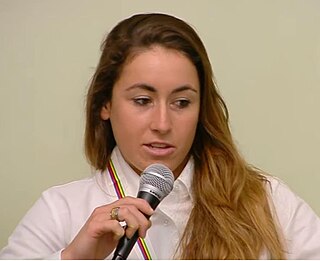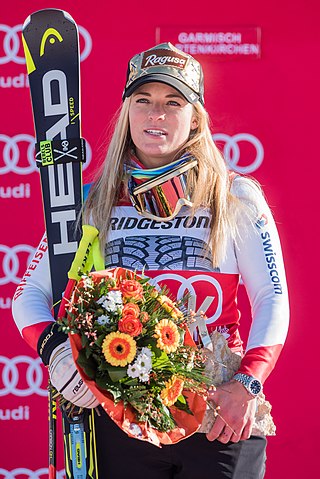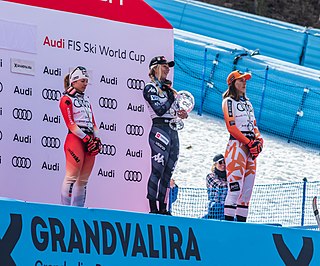
The women's downhill competition in the 2005 FIS Alpine Skiing World Cup involved eight events, including the World Cup season finals in Lenzerheide, Switzerland. In the finals, generally only the top 25 racers in the discipline are eligible to compete, and only the top 15 finishers receive points.

The 46th World Cup season began on 22 October 2011, in Sölden, Austria, and concluded on 18 March 2012, at the World Cup finals in Schladming, Austria.

Sofia Goggia is an Italian World Cup alpine ski racer who competes in all disciplines and specialises in the speed events of downhill and super-G. She is a two-time Olympic downhill medalist — gold at the 2018 Winter Olympics, the first one for an Italian woman — and four-time World Cup downhill title winner.

Joana Hählen is a Swiss World Cup alpine ski racer, specializing in the speed events of Downhill and Super-G.

The International Ski Federation (FIS) Alpine Ski World Cup was the premier circuit for alpine skiing competition. The inaugural season launched in January 1967, and the 2018–19 season marks the 53rd consecutive year for the FIS World Cup.

The International Ski Federation (FIS) Alpine Ski World Cup, the premier circuit for alpine skiing competition, began in January 1967, and the 2019–20 season marked the 54th consecutive year for the FIS World Cup. As it had every year since 2006, the season began in Sölden, Austria in October. The season was supposed to end with the World Cup finals in March, which were to be held in Cortina d'Ampezzo, Italy for the first time since they began in 1993, but the finals were cancelled due to the COVID-19 outbreak in Italy.

The International Ski Federation (FIS) Alpine Ski World Cup was the premier circuit for alpine skiing competition. The inaugural season launched in January 1967, and the 2020–21 season marked the 55th consecutive year for the FIS World Cup. As it had every year since 2006, the season began in Sölden, Austria in October, and it ended with the World Cup finals in March, which were held in Lenzerheide, Switzerland. However, the COVID-19 pandemic forced many changes to the original racing schedule. Among them were the following:

The women's downhill in the 2021 FIS Alpine Skiing World Cup consisted of seven events. The original schedule had called for eight downhills, but the World Cup finals race was canceled.

The women's downhill in the 2022 FIS Alpine Skiing World Cup consisted of nine events including the finals. Defending champion Sofia Goggia of Italy, who won four of the five downhills in which she competed in 2020-21, continued her domination in 2021-22 by again winning four of the first five downhills. Goggia took a commanding lead in the discipline after American Breezy Johnson, who finished second in each of the first three downhills, missed the rest of the season with a knee injury. Goggia then suffered her own knee injury, including a broken bone and ligament tears, while training for the last downhill prior to the 2022 Winter Olympics, but she was able to continue competing within a month and, after all but the final race of the season, had such a commanding lead that only one other competitor even had a theoretical possibility of overtaking her. At the finals, Suter failed to score, and Goggia won her second consecutive discipline championship.

The International Ski Federation (FIS) Alpine Ski World Cup was the premier circuit for alpine skiing competition. The inaugural season launched in January 1967, and the 2022–23 season marks the 57th consecutive year for the FIS World Cup.

The women's downhill in the 2023 FIS Alpine Skiing World Cup consisted of nine events, including the final. The original schedule called for eleven events, but the first two races of the season scheduled for 5 and 6 November 2022 in Zermatt/Cervinia, were canceled due to adverse weather conditions; the FIS decided not to reschedule them. Once the season began, a downhill scheduled in St. Anton on 14 January had to be converted into a Super-G due to the inability to hold a pre-race training run on either of the two days prior to the downhill. However, a subsequent Super-G scheduled at Cortina d'Ampezzo was converted into a downhill, restoring the original schedule.

The women's super-G in the 2023 FIS Alpine Skiing World Cup included eight events, including the final. The original schedule called for nine events, but a scheduled downhill at St. Anton on 14 January was converted to a super-G due to the inability to hold pre-race practice runs on either of the two days prior to the event. A later super-G at Cortina was converted into a downhill to restore the original schedule balance, but then a downhill at Crans Montana on 25 February had to be delayed a day due to fog and dangerous course conditions, and the super-G previously scheduled for that day was cancelled and not rescheduled.

The women's giant slalom in the 2023 FIS Alpine Skiing World Cup included ten events, including the final. The season was scheduled to open in Sölden, Austria on 22 October 2022, but the race was cancelled due to bad weather and rescheduled to Semmering, Austria on 27 December.

The women's overall competition in the 2023 FIS Alpine Skiing World Cup consisted of 38 events in four disciplines: downhill (DH), super-G (SG), giant slalom (GS), and slalom (SL). The fifth and sixth disciplines, parallel (PAR). and Alpine combined (AC), had all events in the 2022–23 season cancelled, either due to the schedule disruption cased by the COVID-19 pandemic (AC) or due to bad weather (PAR). The original schedule called for 42 races, but in addition to the parallel, two downhills and a super-G were cancelled during the season.

The men's downhill in the 2019 FIS Alpine Skiing World Cup involved eight events. Swiss skier Beat Feuz won his second consecutive season title in this discipline.

The women's super-G in the 2019 FIS Alpine Skiing World Cup involved 6 events, including the finals in Soldeu, Andorra. Originally, the season had been planned to hold 8 events, but the two races scheduled in Sochi, Russia were cancelled due to continuing heavy snowfall.

The women's downhill in the 2018 FIS Alpine Skiing World Cup involved eight events, including the season finale in Åre, Sweden. Before the start of the season, defending discipline champion Ilka Štuhec of Slovakia suffered a season-ending injury. Ultimately, the discipline title ended up as a battle between oft-injured eight-time discipline champion Lindsey Vonn of the USA and rising Italian skier Sofia Goggia. Through five races, Goggia had a 63-point lead over Vonn, who had been hampered with an injury at the start of the season. Vonn won all of the last three races, earning 300 points. .. but Goggia finished second in all three, earning 240 points, to hang on to a three-point victory for the season title.

The women's downhill in the 2017 FIS Alpine Skiing World Cup involved eight events, including the season finale in Aspen, Colorado (USA). Defending champion Lindsey Vonn of the USA was injured during the first half of the season, leaving the championship race wide open. However, Slovenian skier Ilka Štuhec won the first three downhills of the season and ended up carrying a 97-point lead into the finals, meaning that all she needed was either to finish in the top 15 herself or for rising Italian skier Sofia Goggia, who was in second, not to win. As it turned out, Štuhec won the final herself, clinching the discipline title.

The women's downhill competition in the 2016 FIS Alpine Skiing World Cup involved nine events, including the season finale in St. Moritz, Switzerland.

The women's super-G competition in the 2016 FIS Alpine Skiing World Cup involved sight events, including the season final in St. Moritz, Switzerland.
















